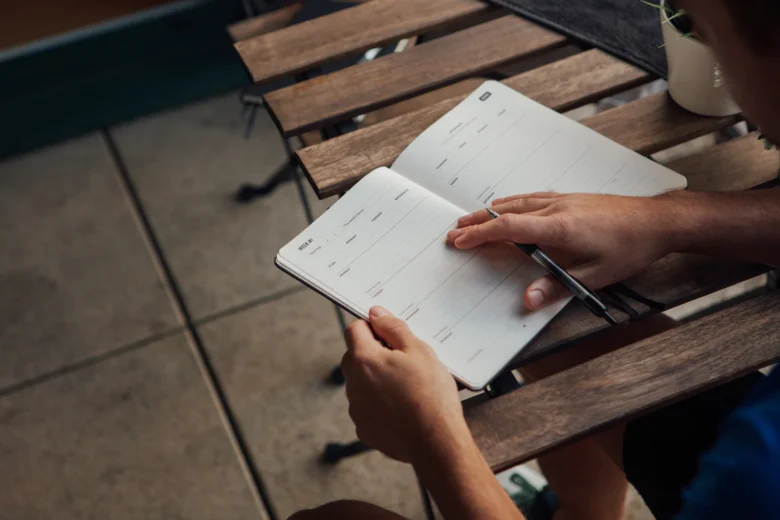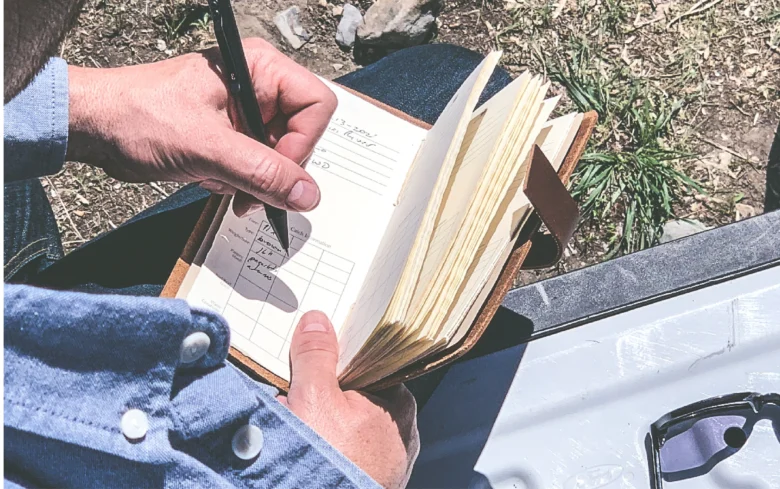Many people enjoy keeping journals. They can be used for a wide range of purposes, including keeping track of one’s life or helping you stay organized. A unique handmade leather journal is the perfect place to document your life.
If you are interested in keeping a journal, here are just some of the best ways in which you can use it:
Contents
1. For Work Or Study

Source: performance-journals.com
One of the most popular ways of using a journal is for work or study purposes.
You might want to bring your journal to an important work meeting so that you can easily write notes. A journal is often much more portable and lightweight than a laptop, making it a great option for commuting to work.
Writing your work notes in a journal will also allow you to be more present in a meeting. They are also much less distracting than a laptop. Not to mention, the continuous pressing of laptop keys can be rather irritating in a meeting. As a result, a journal is a less obtrusive option.
Likewise, a journal can be used to take notes for school or another form of study. You can simply write key points so that you can record key points. Journals are especially useful for coursework preparation.
Be sure to take notes in whatever format you prefer. Many people will opt for bullet points since they will take less time to write.
2. Free Writing
Free writing is a superb technique if you have been feeling overwhelmed with thoughts or feelings. Akin to brainstorming, free writing is merely the process of writing down your thoughts uninterrupted.
Free writing is not meant to have a specific form. Instead, this structureless style of writing is often devoid of complete sentences and paragraphs. When you are free from these restrictions, you will likely find that you can write pages and pages of content.
This style of writing has numerous uses. For example, you can write down your complex thoughts if you have been experiencing challenging emotions.
It can also be used in academic settings. Namely, you can write down your feelings on a particular subject before progressing to more formal modes of research. This will help you to document your initial thoughts which can then be clarified and developed.
To begin with free writing, simply start small. As you become a more experienced writer, you will likely find yourself writing more. You should also refrain from editing your work or crossing anything out, as the entire purpose of this style of writing is to be free from constraints.
3. Dream Journaling

Source: blog.alomoves.com
Dream journaling is the process of recording your nightly dreams in a journal. Dream journaling is intended to help you to better understand your dreams so that you can explore their meaning.
The idea of writing down the contents of your dreams may sound a little odd. Yet, this process can expand your understanding of your emotions. Nobody knows exactly why we have specific dreams, but many people have theorized that dreams have symbolic meanings.
Try to write about your dreams whenever you wake up in the morning. Otherwise, you will likely forget the contents of your dreams. To make this easy, you should position a journal next to your bed.
4. Gratitude
Alternatively, many people will use their journals to express gratitude. For example, you might want to write three things in your journal that you are grateful for. This is a great daily reminder of how much value there is in the world.
This is a great activity to do in the morning. By writing down the things that you are grateful for, you can develop a more positive personality. This optimism will likely spread into the rest of your life.
When you start journaling your gratitude, you can begin with the big things in your life that you are grateful for. As you delve more into journaling, you can become increasingly detailed and specific with the things that you are grateful for.
If you are struggling to think of three things that you are grateful for every day, feel free to write fewer points. On the flip side, you can name more than three qualities that you appreciate if desired.
5. Stress Reduction

Source: creativeboom.com
A final way that you can use your journal is for stress reduction. When people are stressed, their thoughts are often scattered.
To alleviate stress and organize your thoughts, you may want to undertake journaling. Most people will find this journaling process to be incredibly therapeutic.
When using your journal for stress reduction, feel free to be as honest as possible. If you are feeling some intense emotions, you can use harsh language, such as curse words, to relieve your stress.
Once you have produced this outpouring of emotions, you can start to write bullet points that clarify your emotions. Though this will not completely remove your stress, journaling can nonetheless help you to overcome your stress and any other difficult emotions you have been dealing with.
What Are The Benefits Of Journaling?
Journaling provides an impressive range of benefits, including:
- Journaling can help you to overcome stress and anxiety.
- It can help you to reframe your perspective.
- You can feel calm and relaxed after writing down your thoughts.
- It can help you to keep note of important facts that you need to remember.
- You can record key life events so that you can reflect on them at a later date.
- Dream journals may help you to understand why you are having specific dreams.
- You can better understand your emotions.
- Journals can be used in whatever way you prefer.
- You can identify your negative emotions and reflect on them.
- It offers self-reflective opportunities.
The benefits of journaling will depend on how you use this tool.
Final Thoughts

Source: rustico.com
Journals are versatile tools that can be used for an amazing assortment of purposes. It’s worth taking a journal with you wherever you go so that you can write in it whenever desired. Journaling offers a wide range of benefits, making journals a worthwhile addition to your life.
